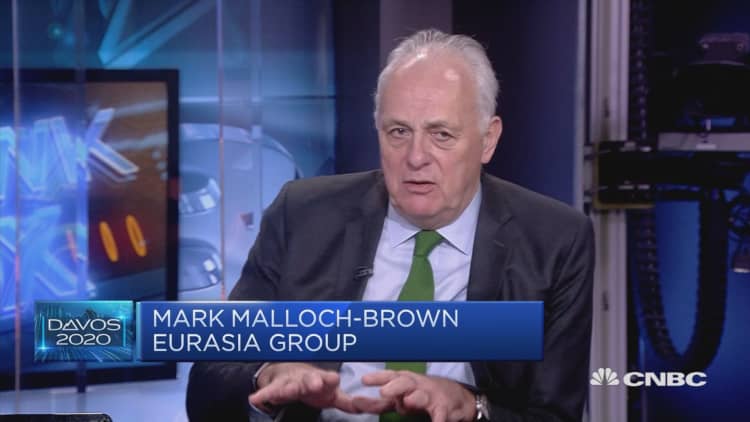
Iran's supreme leader Ayatollah Ali Khamenei has called President Donald Trump a "clown" who merely pretends to support Iranian citizens but would push a "poisonous dagger" into their backs.
The 80-year-old said Friday that the U.S. showed its terrorist nature in killing the former Quds Force commander Qasem Soleimani, according to a Reuters translation, before adding the "assassination" was a disgrace to the U.S. administration.
He also described Tehran's decision to attack military bases housing U.S. troops in Iraq earlier this month as a "day of God."
His comments came as he led Friday prayers for the first time in eight years.
The Islamic Republic is currently grappling with elevated tensions since the death of Soleimani and widespread protests following the accidental downing of a passenger jet that killed all 176 people on board — the majority of whom were Iranian citizens.
Many of those taking part in the rallies have called for the country's top leaders to resign.
Iran's government admitted to the accidental downing of the Ukrainian International Airlines passenger jet on Jan. 11, after days of denying a role in the crash.
Delivering the weekly sermon for the first time since 2012, Khamenei also said Iran would not yield to U.S. sanctions imposed over a dispute on its nuclear program.
The White House was not immediately available for comment when contacted by CNBC Friday morning.
Elevated tensions
Iran's Soleimani was killed in a U.S. drone strike on Jan. 3. It marked the most dramatic escalation between Washington and Tehran in a series of tit-for-tat attacks. Western forces and embassies in the region have been on high alert since then.
The attack prompted Iran to retaliate by launching more than a dozen ballistic missiles at the Ain al-Asad airbase in Iraq's western Anbar province and a base in Irbil in the country's north.
No U.S. service members were killed in the attack but several were treated for concussions, the Pentagon said in a statement earlier this week.

In a televised address after Iran fired missiles at the airbases in Iraq, Trump said Tehran appeared to be "standing down" following an initial spike in tensions.
The Trump administration has claimed its decision to kill Soleimani was taken in part because he was "actively developing plans to attack American diplomats and service members in Iraq and throughout the region."
Iran's Khamenei also claimed on Friday that the U.S. was trying to divide Iraq and trigger a civil war.
Earlier in the week, Iranian President Hassan Rouhani lashed out at the U.S. and Europe, criticizing their military presence in the Middle East during an angry speech on state television.
Rouhani said U.S. troops were currently "insecure" in the region, according to a Reuters translation, before adding EU troops might also be in danger. It was the first time he had directed a threat toward European forces in the Middle East.
— CNBC's Natasha Turak and the Associated Press contributed to this report.


